Time for reform, censorship and good intentions, how California mismanaged its fires, and the housing target is a bust
I trust everyone had a lovely weekend, or for those just getting back into the office, a wonderful summer break!
The people want reform
The Pew Research Centre released the results of its latest survey measuring the “support for changing the current economic system” across 36 countries:
“In most of the countries we surveyed, there is widespread support for changing the economic system. In fact, in all but three nations, majorities say the economic system in their country needs major changes or complete reform.”
That makes sense; the response to the pandemic left a sour taste in many people’s mouths, not just because of how it was handled at the time but also because of the inflationary aftermath. People don’t like being made poorer, and when you print up a bunch of money to pay for your pandemic response that’s exactly what you’re doing.
But of all the countries surveyed, Australia came out on top:
“In 10 countries, significantly greater shares of adults favour major economic change or complete reform this year than in the past. In fact, this share has doubled in Australia since 2021 – from 32% then to 64% today. Support for large-scale economic change is also up in several European countries compared with three years ago.”
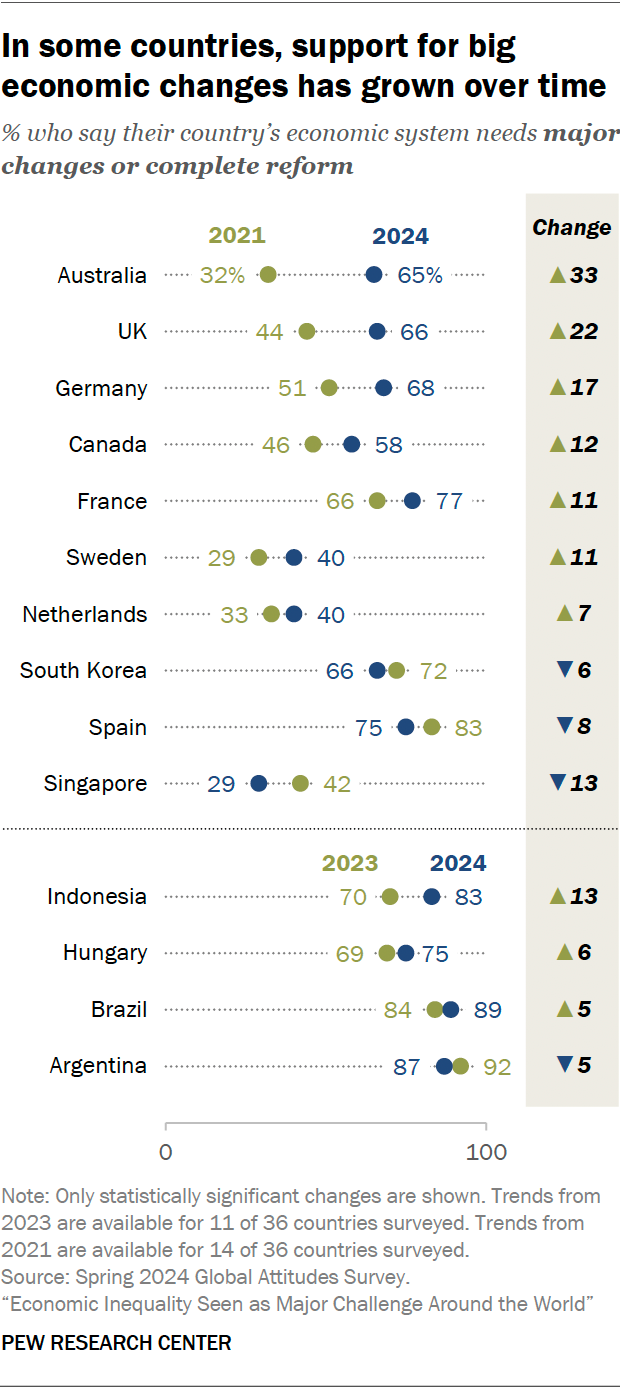
What the survey doesn’t ask is what type of “economic changes” people want, just that it should be “major” or “complete”. Unfortunately for the 65% of Australians who are hoping for change, neither side of Australia’s two-party political oligopoly are offering it at the next election.
The Albanese government’s economic policies amount to a doubling-down on its renewables-driven revival of the failed industrial policies of the 1950s, 60s, and 70s, and to continue spending like we’re still in the middle of a pandemic.
Then there’s Peter Dutton’s just-released plan, which is chock-full of low-substance rhetoric like “rein in wasteful spending” and “cut government waste”. Those phrases might sound familiar because they were also used as part of Anthony Albanese’s 2022 campaign pledge to end the “rorts and waste” of the Morrison government; they are the calling card of politicians who have run out of ideas or never had any of their own to begin with.
Neither party appears to be serious about changing the status quo, let alone capable of planning for the spending and tax reform needed to buck this trend, for which both major parties are responsible:

Where is Australia’s Javier Milei?
Sacrificing free expression on the altar of good intentions
Why is it that Australian political innovation is always of the authoritarian type? With the passing of the social media age verification laws in a rushed session at the end of 2024, elites in other countries with a taste for tyranny are eagerly looking to follow:
“One of the new online age-verification laws has reached the Supreme Court. A Texas law (H.B. 1181) age-gates commercial websites that are at least one-third ‘sexual material harmful to minors.’ Such websites must deploy an age-verification system based on digital IDs, uploaded government-issued IDs, or ‘a commercially reasonable method that relies on public or private transactional data.’ The law instructs the entity that runs the age-verification system ’not [to] retain any identifying information’; but it does not prohibit sharing such information with third parties, and it contains no data-security protocols of any kind.”
My view is the elites aren’t happy that social media has eroded some of their control over information, which they’ve been able to ‘manage’ in the past by remaining chummy with the legacy media oligarchs. By forcing social media companies to verify people’s age, they regain some of that control by removing their critics’ anonymity.
In Australia, censorship is supported by both sides of politics. For what it’s worth, despite certain US states choosing to “sacrifice privacy, free speech, and parental authority on the altar of good intentions”, as a whole the US appears to be moving in the other direction:
“Zuckerberg stated that Meta would be returning to its ‘roots around free expression’. While he agreed there was definitely harmful content out there that needed to be removed, he also pointed out that ‘governments and legacy media have pushed to censor more and more’.
Though it may be small in terms of percentage, he now believes too much content has been removed and, as a result, that Meta has lost the trust of many users.”
I worry that no matter which party wins the next federal election, the toxic misinformation bill is likely to rear its ugly head yet again.
The most poorly governed state in America
I was going to end the title above with a question mark but with what has transpired in the past week, I don’t think it’s up for debate:
The California fires could cause up to $US50 billion in damages. And they might have been preventable, had the Californian government not crippled itself and its residents in so many ways.
First, California doesn’t do nearly as much prescribed burning as it should. By one estimate, it should have been doing “almost 8 times as much as it’s currently doing… to reduce fuel loads to lower fire intensity and severity, thereby reducing the economic burden of wildfires”.
Here’s the cost benefit analysis of prescribed burning in California:
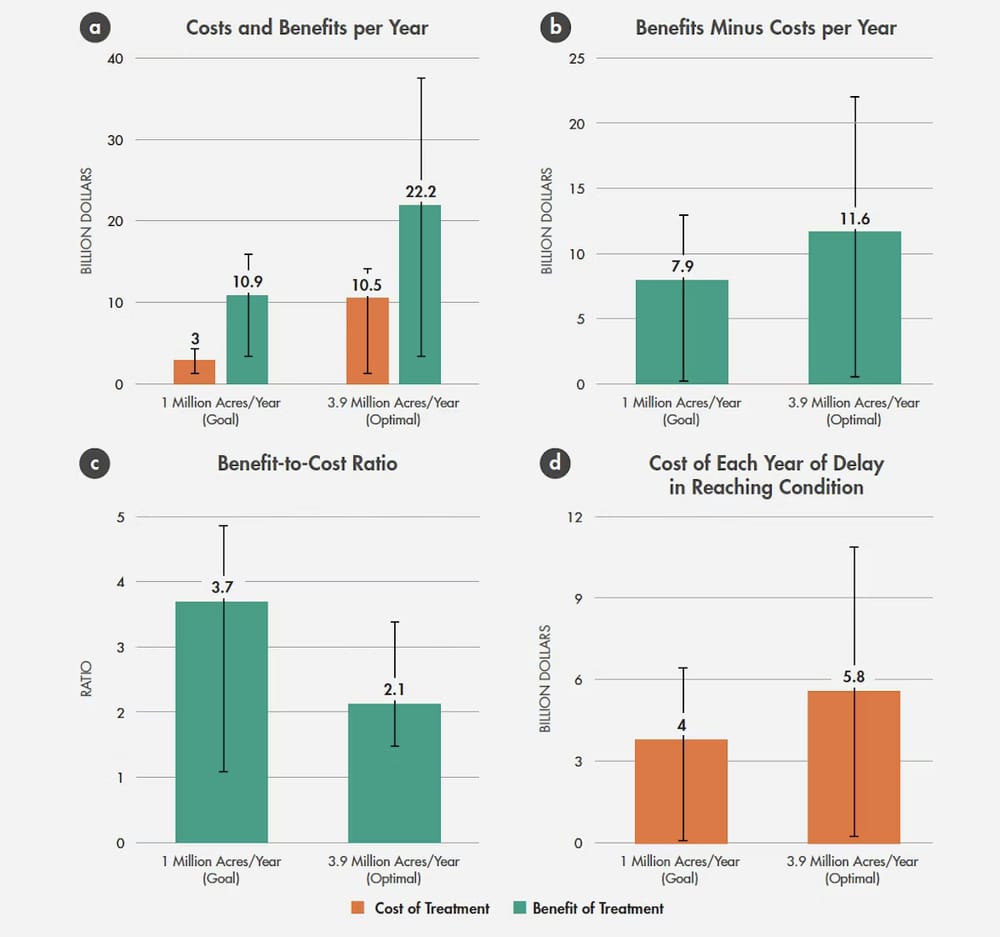
Why does the California government find it so difficult to even meet its own burnoff targets? Because every time it wants to do one, the National Environmental Policy Act mandates that it must first go through a costly and time-consuming approval process:
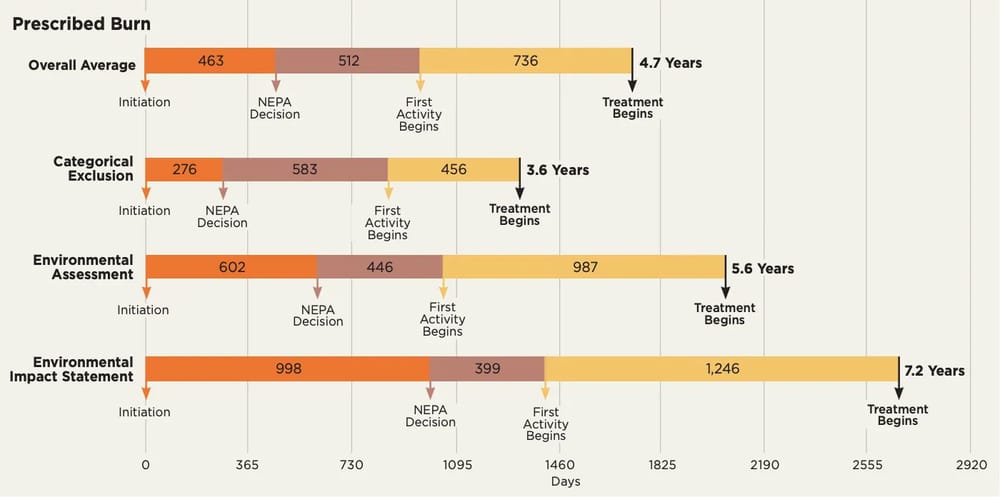
Second, it’s ridiculously difficult to get fire insurance in California because of state price control laws that distort the market for it:
“If an insurer shows they need a 40% increase to cover expected costs and get a fair return, but regulators only approve 15%, that’s a 25% rate suppression. CA ranks 50th in rate suppression - approving rates 29% below what actuaries show is needed for homeowners insurance.
In plain English: regulators force insurers to sell WAY WAY below cost.
…
The system is also uniquely rigid. CA won’t let insurers:
- Use catastrophe models to project future fire risk
- Consider reinsurance costs
A state leading on climate change won’t let insurers use climate science to price risk.”
The result is that insurance companies, unable to price their products properly, don’t renew existing policies and stop issuing new ones. That’s a problem, so the state government – rather than allow prices to work – decided to create the California FAIR Plan, which sells fire insurance to those unable to get it privately:
“In 2023, the plan covered an estimated $284 billion in home value. In 2024, that exposure increased by 61 percent. Within the next few years, California taxpayers could be on the hook for more than a trillion dollars. The state insurance commissioner is scrambling to bring insurers back. But it may be too little, too late.”
Third, underpriced insurance and restrictive zoning laws that prohibit infill have incentivised sprawl out to the fire-prone fringes where homes and lives are more at risk:
“From 1990 to 2020, California built nearly 1.5 million homes in the wildlife-urban interface, putting millions of residents in the path of wildfires. Policy didn’t just pull Californians into dangerous areas. It also pushed them out of safer ones. Over the past 70 years, zoning has made housing expensive and difficult to build in cities, which are generally more resilient to climate change than any other part of the state.”
The state had been lured into a sense of complacency, with the number of fires falling over the last 100 years – “what we’re seeing now is a return to the ’normal’ levels of fire of the early 1900s”.
While higher temperatures due to climate change “works to dry fuels and makes fires more intense”, it’s not the cause of the fires themselves. As climate scientist Patrick Brown’s work has shown, the Santa Ana winds spreading the fire are likely to become “less intense/frequent as the climate changes”, and “there is little evidence that climate change would be responsible for a lack of precipitation”.
Fires are a fact of life in California, just as they are in Australia. But they needn’t be so destructive – sensible actions taken in advance can limit the loss of life and property, while well-meaning but counter-productive policies will make them much, much worse, as California’s government has demonstrated.
The government’s housing target is not going well
The number of building approvals in Australia “stood at 169,138 on a rolling annual basis at the end of November 2024, well below the federal government’s commitment to build 240,000 new homes each year starting July 2024”.
That’s an 11-year low:
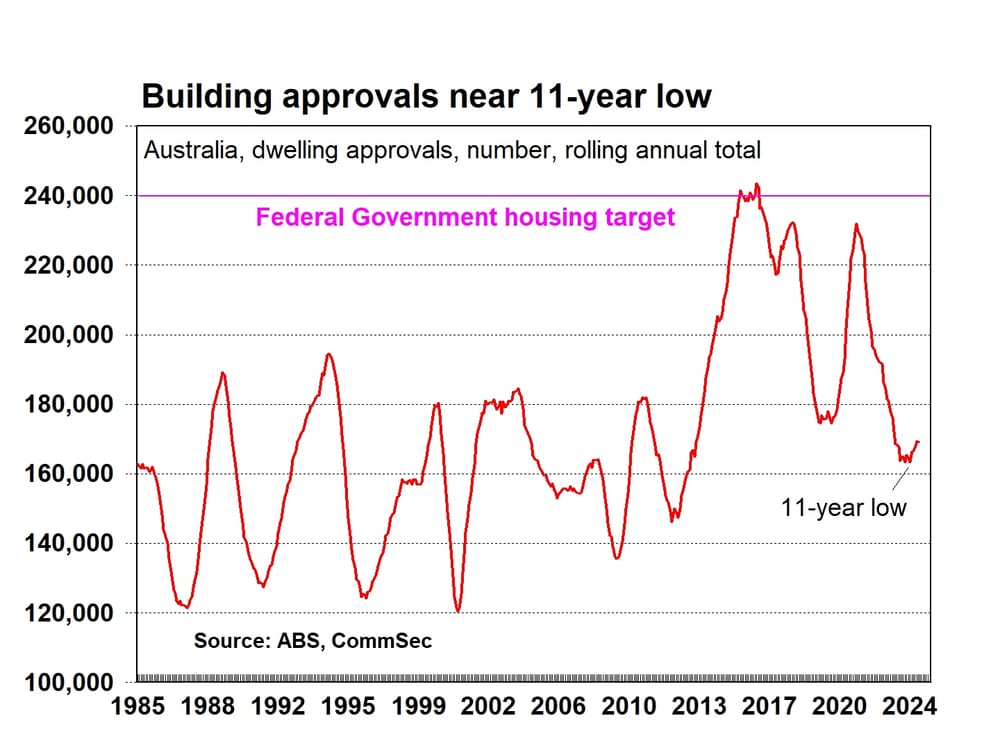
The government’s target was out of reach as soon as it was announced. As I wrote back in July 2024:
“Then there’s the Housing Accord’s target of ‘1.2 million new, well-located homes’ by 2029, which only started this month and already looks unachievable. After a post-pandemic surge, new housing commencements have fallen back down to below the long-run average of around 26,500.
Add to that high interest rates, elevated construction costs, needing to navigate the existing planning system, pervasive NIMBY attitudes, and the target of 60,000 new homes every quarter for five years is basically impossible.”
House prices are high because demand has outstripped supply for decades. The issue isn’t a lack of competitive forces preventing people from trying to profit by adding to supply, but the restrictions imposed by various levels of government that prevent them from doing so. A housing target that doesn’t adequately address those restrictions will never succeed.
On a positive note, if those restrictions are eased the impact on prices should be meaningful, even if the new supply is “market-rate” rather than “affordable” housing:
“A 1% increase in new supply lowers average rents by 0.19%, effectively reduces rents of lower-quality units, and disproportionately increases the number of second-hand units available for rent. Moreover, the impact on rents is equally strong in high-demand markets… New supply triggers moving chains that free up units in all market segments.”
I’ve said it before and I’ll say it again: in a supply-constrained market it doesn’t matter what type of housing you build, just so long as you build!
Fun fact
South Korea is the poster child of the world’s demographic decline:
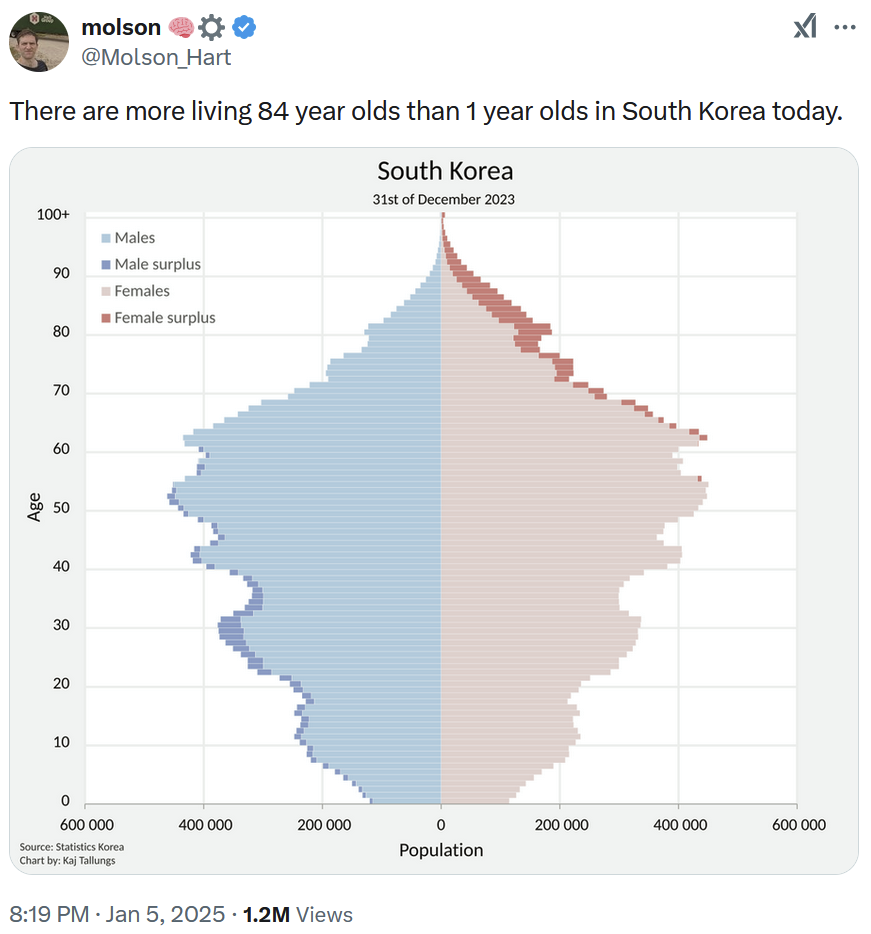
Further reading
- Other than more affordable housing, the ’90s weren’t that great.
- And here I was thinking that Australians were champions of the sickie. “With the economy slowing and the welfare system under pressure, Germany can ill afford its average per worker of 20 sick days a year, said Oliver Bäte, the chief executive of Allianz SE. The EU average is eight.”
- Tip of the iceberg? “NDIS officials are understood to have privately briefed police across the country that the real scope of fraud could be as much as $8bn, plus billions more in overcharging — and that nobody knows exactly how much is being lost.”
- There’s no evidence for so-called “greedflation”, with another new paper finding that “median markups across all firms decreased over time, especially in 2021 and 2022 (years with highest inflation)”.
Comments
Comments have been disabled and we're not sure if we'll ever turn them back on. If you have something you would like to contribute, please send Justin an email or hit up social media!
